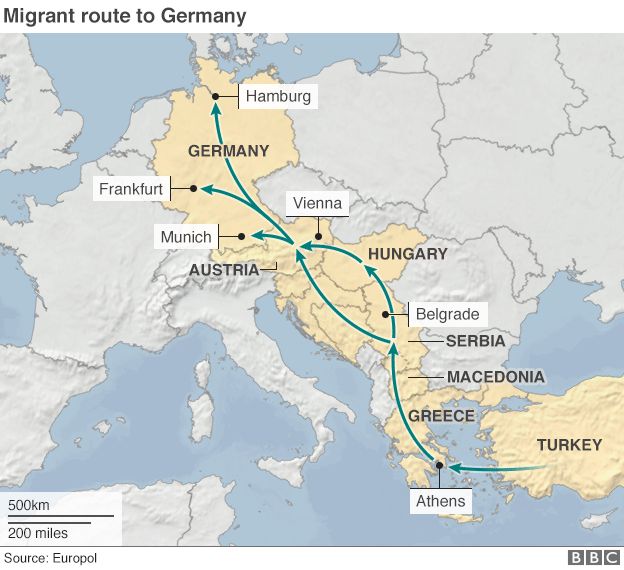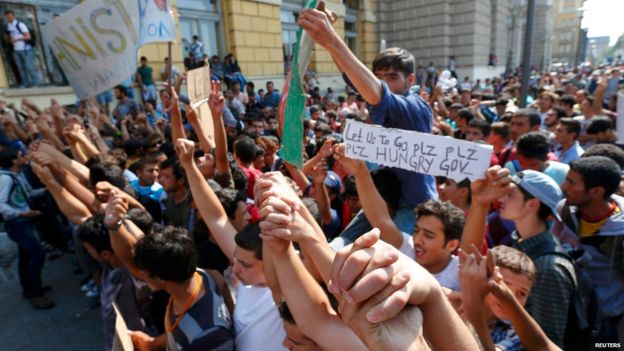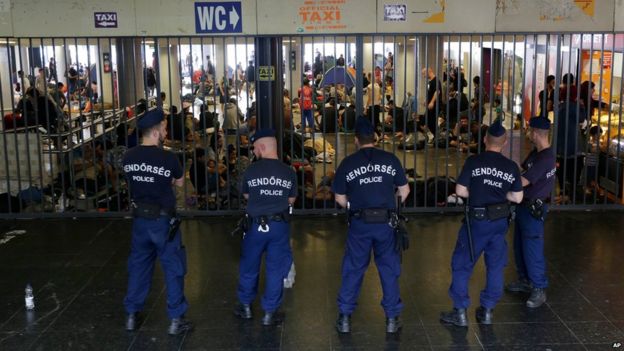Hundreds of migrants have protested for a second day at Hungary’s decision to prevent them from travelling on towards Germany and other EU countries.
They are among 2,000 people camped at Budapest’s Keleti train station, having bought tickets for onward journeys.
Meanwhile, more than 4,000 migrants arrived in mainland Greece from the island of Lesbos overnight.
The EU is struggling to agree a common policy across member states for dealing with the crisis.
The BBC’s Chris Morris in Brussels says the European Commission, the executive of the EU, is trying to draw up a list of safe countries of origin that failed asylum applicants can be sent back to.
And an EC spokeswoman said today it was preparing proposals for a mechanism to automatically redistribute a proportion of those seeking asylum among EU states.
Italy and Greece have complained that they are overwhelmed by the numbers arriving on their shores.
In other developments:
- Five children were among 12 migrants who drowned in Turkish waters while trying to reach Greece, officials said; images of a child’s body washed up near the resort of Bodrum were circulating widely on social media
- Aid agency Medecins Sans Frontieres tweets that two of its boats have rescued nearly 1,000 people from the Mediterranean
- Police in Austria released 24 Afghan migrants who were in danger of suffocating from the back of van
- A man was arrested in the German town of Massow after attacking people in a migrants’ centre with pepper spray
- Eurostar trains between London and Paris were disrupted overnight after migrants got on to train tracks
Czech unease at migrant numbering
Syrian’s perilous journey to Sweden
Cameron: Taking more refugees not the answer
Full coverage of Europe migrant crisis

About 2,000 migrants camped overnight at Keleti station in east Budapest, having been prevented from boarding trains on Tuesday.
They had bought tickets after Hungary appeared to abandon efforts on Monday to register migrants, allowing huge numbers to board trains to Vienna and southern Germany.
Hundreds of migrants again protested on Wednesday, chanting “Freedom, freedom” and waving train tickets.
Journalists at the scene said tensions were high with migrants involved in a stand-off with riot police.
A confrontation also broke out an another railway station in Budapest where a group of migrants occupied a platform after refusing to board a train sending them to a reception centre in the eastern city of Debrecen.
Police quoted by Hungarian TV said the “illegal immigrants” held their children aloft and demanded they be allowed to proceed freely to Germany.


At-the-scene: Nick Thorpe in Budapest, Hungary
The stalemate around Keleti station continues. Many families are trying to decide what to do now. Everyone is asking each other the same question – will they be allowed to carry on their journeys or are they stuck here until their money runs out?
Lines of police are currently blocking the entrance to the station. People are very frustrated and very angry.
I was talking to two Syrian girls who said they hadn’t washed for days. They said the Hungarians looked down on them, and that hotels and restaurants around the station were increasingly not allowing them in. They feel very humiliated by the situation.
Prime Minister Viktor Orban is due to meet EU chiefs on Thursday to discuss Hungary’s handling of the crisis.
Under an EU rule known as the Dublin Regulation, refugees should seek asylum in the first EU country they enter.
But this has proved hard to uphold, with border countries such as Hungary, Italy and Greece saying they cannot cope with the numbers. All three are members of the borderless Schengen Area.
In another development, border controls between Italy and Austria are set to be reintroduced following a request from Germany, Italian officials said.
The northern province of Bolzano said the German state of Bavaria had asked for “logistical support”.
Bavaria, particularly the city of Munich, has seen record numbers of migrants arriving from the south. Austria is also performing spot checks on its border with Hungary.
The German government has already said it will allow Syrians arriving from other EU states to apply for asylum. But on Tuesday, a spokesman said the Dublin Regulation had not been suspended.
German Chancellor Angela Merkel has called for asylum seekers to be distributed more equally across the EU.
But on Wednesday, UK Prime Minister David Cameron said that taking “more and more” refugees was not the answer.
Greece saw the arrival of 23,000 migrants last week alone, said the EU’s border control agency Frontex – an increase of 50% on the previous week.
Many of those arriving in the country do so on the island of Lesbos, where, according to the Kathimerini newspaper, 17,500 migrants were registered in the last week.
Some 4,200 migrants were brought from Lesbos to the port of Pireaus, near Athens overnight.
Greece’s government says it lacks the resources to look after so many arrivals, but aid groups say the authorities should be doing more.
Greece’s caretaker cabinet is set to convene to discuss the issue later on Wednesday.
Migrants or refugees?
The word migrant is defined in the Oxford English Dictionary as “one who moves, either temporarily or permanently, from one place, area, or country of residence to another”.
A refugee is, according to the 1951 Refugee Convention, any person who “owing to a well-founded fear” of persecution is outside their country of nationality and “unable” or “unwilling” to seek the protection of that country. To gain the status, one has to go through the legal process of claiming asylum.
The word migrant has traditionally been considered a neutral term, but some criticise the BBC and other media for using a word they say implies something voluntary, and should not be applied to people fleeing danger.
Battle over words to describe migrants
The number of migrants entering Europe has reached record levels, with 107,500 arriving in July alone.
Germany expects to take in 800,000 migrants this year – four times last year’s total.
The risks for migrants travelling through Europe were highlighted last week by the deaths of 71 people found in a lorry that had travelled to Austria from Budapest.
EU interior and justice ministers will meet in Brussels on 14 September to address the crisis.
BBC
 Q FM Africa's Modern Radio
Q FM Africa's Modern Radio